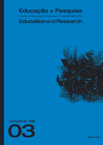Contributions and difficulties in dealing with social/scientific issues in the practice of science teachers
DOI:
https://doi.org/10.1590/S1517-97022012005000014Keywords:
Science teacher education, Critical qualitative research, Critical hinking, Decision-makingAbstract
This paper presents the results of a research about the contributions and difficulties in dealing with social/scientific issues related to the teaching practices of in-service science teachers. In this qualitative and critical research, reality is understood as a social construction that is both subjective and inter-subjective defined by a historical context. Data collection was conducted while a subject on science teaching was being delivered based on social/scientific issues, which took place in M.Sc. course on chemistry teaching and involved 31 in-service science teachers. With the purpose of assuring the research would be valid and trustworthy, more than one source of data was utilized. Thus data was gathered by recurring to several tools including: initial questionnaire to depict research participants, recording of focal interviews and assignments handed in by the teachers on social/scientific issues (SCIs) in the classroom. Analyses found that dealing with social/scientific issues has a considerable potential for the teaching practice in terms of decision-making and developing critical thinking by students. Teaching with the use of social/scientific issues also requires planning and well-sustained actions as well as the active participation of the teacher. Finally, difficulties are described in regard of the work done in its pedagogical, training and curricular aspects.Downloads
Download data is not yet available.
Downloads
Published
2012-09-01
Issue
Section
Articles
License
Authors assume exclusive responsibility for the concepts expressed in their articles, which do not necessarily reflect the journal’s opinion.
Permission to photocopy all or part of the material published in the journal is granted provided that the original source of publication be assigned.
How to Cite
Contributions and difficulties in dealing with social/scientific issues in the practice of science teachers. (2012). Educação E Pesquisa, 38(3), 727-741. https://doi.org/10.1590/S1517-97022012005000014



